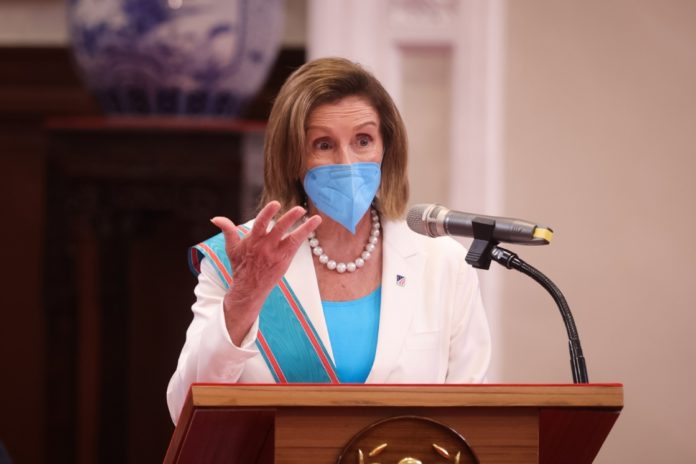This article was originally published on Newsweek.
U.S. House of Representatives speaker Nancy Pelosi‘s much-debated trip to Taiwan has come and gone. The trip prompted unprecedented threats from China’s “wolf warriors,” and even President Biden advised against the speaker’s trip. Jake Sullivan, Biden’s national security advisor, insisted that the President is committed to the policy of strategic ambiguity when it comes to China’s sovereignty over Taiwan, even though Biden has publicly and repeatedly vowed that the U.S. would defend Taiwan if and when China uses force against the island-nation.
But Speaker Pelosi was right to go. Such a confusing and oscillating policy will prove perilous to the already-frail state of cross-Strait relations.
It seems clear that the Chinese Communist Party (CCP) is determined to invade Taiwan as soon as the opportunity arises, evidenced by the removal of the word “peaceful” from China’s Taiwan reunification policy and messaging. Moreover, People’s Liberation Army military aircraft are now regularly dispatched over Taiwan’s air defense identification zone, a clear act of intimidation and aggression. And Taiwan-oriented war preparations have ramped up throughout the mainland. Beijing also now claims that the Taiwan Strait is not “international waters,” and has made clear that seizing Taiwan is the last key step toward achieving China’s goal of “national rejuvenation.”
CIA director William Burns believes it’s only a matter of time before China invades Taiwan. For years, Beijing has been gradually amassing considerable military power, and such efforts have accelerated in recent years.
Indeed, gradually amassing staggering levels of military forces armaments to fight a “war of annihilation” is in the PLA’s political DNA, and the human cost, no matter how high, is irrelevant to the CCP. Expect China to wage unrestricted warfare to achieve its goal of “liberating” Taiwan, as indicated by China’s defense minister Wei Fenghe’s recent threats that the Party-state would “fight at all costs” and “to the very end” if Taiwan pursued independence.
Even if Taiwan maintains the status quo, China will still attack, because annexation of Taiwan is a key component of the CCP’s dream of “national rejuvenation” and the political legacy Xi wants to secure.
Proponents of strategic ambiguity as the U.S.’s Taiwan stance argue that although it is flawed, this approach has worked well in the past and will likely continue to work in the future.
We disagree. The power dynamic has shifted. With continuing increases in China’s composite strength and capacity, the CCP believes that the West is declining while China is rapidly rising. Beijing further believes that it has the power to defeat the U.S., which would be the last obstacle China needs to overcome to achieve “national rejuvenation.”
When Xi believes China’s overall capacity is greater than or equal to Taiwan and the U.S. combined, he will order an invasion. And that time is approaching. China has already acquired sufficient know-how and talent to compete with the U.S., and the global market provides vast resources for China to continue its weapons R&D program and military modernization.
Strategic ambiguity may have been effective in the past, when the power disparity between the U.S. and China was much greater. This is no longer the case.
In the wake of the 1995–1996 Taiwan Missile Crisis, then-President Bill Clinton ordered two additional aircraft carrier battle groups to the Taiwan Strait in March 1996. The following year, when then-House speaker Newt Gingrich visited China and Taiwan, he categorically told senior CCP officials that the U.S. would intervene militarily if China attacked Taiwan. It was the strategic clarity of these two actions—not strategic ambiguity—that enabled cross-Strait peace and stability to be maintained.
But as China’s military power grows, the CCP is no longer satisfied with maintaining the cross-Strait status quo. Beijing wants to isolate Taiwan by preventing visits by top U.S. officials like Speaker Pelosi’s. The Chinese regime also wants Taiwan to accept the “one-country two-systems” policy that it imposed on Hong Kong.
With an ambitious and aggressive dictator like Xi Jinping at the helm, the risk is mounting by the day. Unless Washington draws a clear red line, China will bet against the U.S..
Strategic clarity would best serve the interests of all parties. Now that China is determined to use force against Taiwan, the U.S. must be unwavering in her resolve to defend the island-nation.
Jianli Yang is founder and president of Citizen Power Initiatives for China and the author of For Us, the Living: A Journey to Shine the Light on Truth.
Lianchao Han is vice president of Citizen Power Initiatives for China. After the Tiananmen Square Massacre in 1989, he was one of the founders of the Independent Federation of Chinese Students and Scholars. He worked in the U.S. Senate for 12 years, as legislative counsel and policy director for three senators.
The views expressed in this article are the writers’ own.


